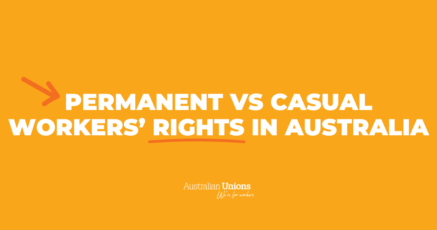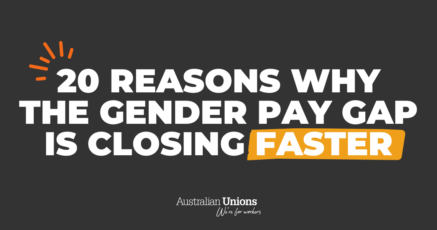How secure is your job?
It’s a question we all found ourselves asking during the pandemic, as hundreds of thousands of workers found themselves without work overnight.
It’s a question we ask a lot at Australian Unions. Afterall, securing better work conditions is the bread and butter of what we do.
Now, as Australia begins its pandemic recovery, the question of job security is more important than ever.
We need to use this moment to build a fairer and stronger Australia – where we can feel protected in our jobs. This begins with tackling the insecure jobs crisis in Australia.
Let’s break down what that means and why it’s so important to your working future.
What exactly is an insecure job?
When we talk about insecure jobs, we mean work that has unpredictable pay and hours, with less rights and entitlements like access to paid leave. It’s work that provides workers with little economic security and little control over their working lives.
Millions of workers in Australia are in some form of insecure work – that includes 2.3 million casuals, over a million on independent contracts and over 400,000 on fixed term contracts.
Isn’t that sort of work a normal part of the job market?
While there will always be a need for some casual or contract work, we are seeing a worrying increase in insecure work. In fact, Australia currently has one of the highest levels of unreliable work in the OECD.
And it’s getting worse. Since the start of the pandemic recovery, almost 60 per cent of jobs created have been unreliable casual jobs.
But isn’t any job better than no job?
Being able to pay the bills is the number one priority, we get that. But unreliable work means an unreliable income.
Right now, millions of workers are living pay cheque to pay cheque. We now have record numbers of Australians been forced to work two or three jobs just to get by.
New ABS data showed that 1.5 million working Australians do not have $2000 in savings or ready cash for an emergency. Another 570,000 wouldn’t be able to raise even $500 in a week to cover an emergency.
The reality is millions of Australians are just one unexpected bill away from financial disaster. It’s scary stuff.
Isn’t that just a knock-on from COVID?
There’s no question that the economic impacts of the pandemic were staggering. But if anything, COVID-19 exposed the already existing problem of insecure work in Australia – a problem created by government economic policies that put big business ahead of Australian workers.
Rather than seeing the pandemic as a wake-up call, the Morrison government has doubled down on its efforts to further casualise work in Australia, leaving both workers and the economy in an uncomfortably vulnerable position.
What? How have they done that?
Recent changes to work laws by the Morrison government have made jobs less secure and easier to casualise. These changes have propped up a business model that shifts all the risk from the employer to the employee.
It’s an unfair and unbalanced system that lines the pockets of a few, while leaving working families shouldering more and more household debt.
So how can we fix this?
We need real action and a firm commitment from the Government to provide workers with secure and reliable jobs.
We need reforms to our labour laws and institutions that protect workers from exploitation and helps them plan for a better future.
That’s why Australian Unions is calling for a national target to halve the number of insecure jobs in Australia by the end of 2030.
You can support our campaign to make work more secure and reliable for millions of working people by following these steps:






SHARE:
Break it down for me: job security and your working future